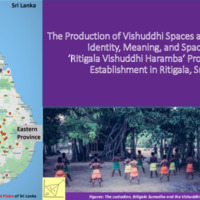Browse Exhibits (1 total)
Dinushi Samarasekara | The Production of Vishuddhi Spaces and their Subjects: Identity, Meaning, and Space of the ‘Ritigala Vishuddhi Haramba’ Process and Establishment based in Ritigala, Sri Lanka

This is an ethnographic study centered around the community and space of the subjects known as the Ritigala Vishuddhi community, the bearers of indigenous combat art, Ritigala Vishuddhi Haramba, which originated and evolved in the countryside of Ritigala, Sri Lanka. Despite the ancient lineage of attending national security, what they practice today is contemporary. The Shilpa bearers’ culture and the way of life are thoroughly enriched with the Vishuddhi Haramba teachings. While it creates a new meaning, identity, and sense of place, the Vishuddhi Haramba education is strongly tied to their history.
As Henri Lefebvre (1991) points out space is socially produced: Every social practice creates space and space affects practices. Specific communities in specific cultures give different meanings to their space.
Apparently, the Vishuddhi Shilpis are a unique community with a unique practice, culture, and identity. They are the creators of their unique space.
The study brings about the worldviews, perceptions, and aspirations of this community, expressing who they are, what they do, their knowledge, what spaces they make, through what practices, and why these spaces are important to them, and how they produce their spaces to function on daily basis creating the identity and sense of place.
Faculty Mentor: Nihal Perera
Urban and Regional Planning
Graduate
